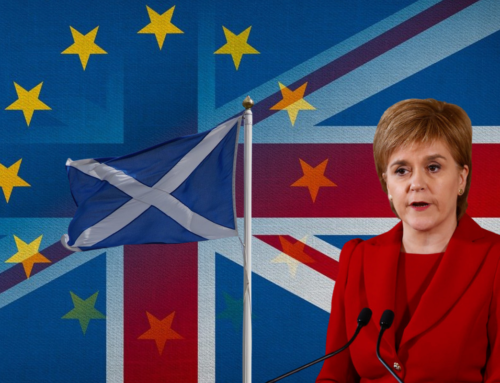by Brendan Donnelly, Director, The Federal Trust
24th September 2018
Over the past two years, the Conservative Party has been riven by the conflict between those who wanted the United Kingdom after Brexit to remain closely aligned with the European Union as a trading partner; and those who did not, or at least attached little or no importance to doing so. The Prime Minister’s desire to find a negotiating strategy reconciling these two widely different approaches led to the enduring stalemate and incoherence which the “Chequers” plan was designed to overcome. Unsurprisingly, this plan pleased neither side of the Conservative debate and attracted a final, unexpectedly categorical rejection from the EU at the Salzburg summit.
The “Chequers” plan itself, while presented by Mrs. May as a compromise, leant in the direction of those wishing a radical break with the EU, the desire of most of the Conservative Party outside Westminster. It seems likely that the criticism now directed at it by Mr. Tusk and others will hasten the process whereby the Conservative Party unambiguously embraces a more distant future relationship, perhaps taking the Canadian Free Trade Agreement (FTA) as a model.
In many ways, this final acceptance of a more distant and less integrated future relationship will clarify and facilitate the Brexit negotiations. The European side had always made clear that one acceptable template for EU/UK relations after Brexit was indeed the Canadian FTA. It was the repeated argument of Michel Barnier and others that Mrs. May’s “red lines” of rejecting free movement and the authority of the European Court of Justice made any closer relationship impossible. But this clarity arising from Salzburg will come at a cost.
The question of an Irish “backstop” has long been an intractable element in the negotiations. If the UK is heading towards a simple FTA with the EU, the problem of this “backstop” becomes even more acute. The major reason why Mrs. May spent so long before coming up even with the abortive “Chequers” proposals was to preserve the appearance of harmony within her own fractious party. But an important subsidiary reason for her long ambiguity was the consciousness that any emerging clarity about the British negotiating position might well exacerbate the difficulties inherent in the “backstop.”
View from Dublin
From the beginning of the Brexit negotiations the Irish government was well aware that Brexit was likely to lead in the medium term to the erection of at least some customs and regulatory barriers between the UK and the EU. It always viewed with some scepticism the claim of Mrs. May that a bespoke post-Brexit arrangement for the UK would ensure the maintenance of frictionless trade with the EU. Any new barriers to trade with the UK would of course pose an especial problem for the government in Dublin. Anglo-Irish trade is centrally important to the Irish economy. Even more importantly, however, new barriers to trade within the island of Ireland are rightly feared by Dublin as a potential threat to the existing level of economic, social and political integration in the island of Ireland, to which the Good Friday Agreement of 1998 made a decisive contribution.
Supported by the rest of the EU, the Irish government has made it a central objective of the Brexit negotiations for the EU side to ensure that whatever general trading arrangement between the UK and the EU emerges there will be arrangements applicable to the island of Ireland that ensure genuinely frictionless interchange between Northern Ireland and the Republic. In the view of the Irish government, this objective can only be secured by the much-discussed “backstop,” which will protect frictionless trade in all circumstances. The prospect of an FTA as the final outcome of the Brexit negotiations will certainly increase the concerns of the Irish government in this regard.
Although it seems that the mood of the Salzburg European Council was already souring against Mrs. May, particular exception was taken by Mr. Varadkar and others to her remark to the Taoiseach on the second day of the conference that the British government would not be able to produce its favoured text for the Irish backstop before the next European Council. In the Joint Report of December 2017, the British government unambiguously agreed to the principle of a backstop, but demurred at the Commission’s formulation of this principle in a draft treaty text of March, 2018. The UK’s partners have been awaiting since that date for the proposed alternative British version of a final treaty text. There is considerable suspicion that Mrs. May’s government, under pressure from the DUP, is now unable or unwilling to come up with any text remotely acceptable to Ireland and the EU. Some on the British side continue to hope that the EU’s undoubted desire to achieve a Withdrawal Agreement (including a “transition” period) with the UK in October or November of this year will ensure that a way will be found out of this impasse at the last possible negotiating moment. The debacle of Salzburg strongly suggests that British officials and politicians are too much given to wishful thinking in their assessment of likely attitudes and negotiating tactics from the EU side.
In reality it is difficult to see how either side can now make the concessions necessary to agree an Irish “backstop.” The dependence of the British government on the DUP to sustain its minority government prevents its acceptance of otherwise obvious steps such as the creation of a “New Economic Zone” for Northern Ireland to meet Irish concerns. There are, moreover, many in the Conservative Party actively working to prevent any Withdrawal Agreement and controversy over the “backstop” is for them a welcome pretext for delay. Much of the Conservative press has spent the past eighteen months claiming that the Irish government is pursuing an agenda of Irish reunification by exaggerating the objective problems caused for the island of Ireland by an FTA or similar outcome to the Brexit negotiations. On a number of occasions since December 2017, the British government has made it clear that it regrets having accepted so unambiguously the principle of the “backstop” in the Joint Report. That is almost certainly the reason why no alternative British text for the “backstop” has emerged over the past six months.
All for one and one for all
The EU for its part regards the Good Friday Agreement as a signal achievement of peace-making that it does not want to see jeopardised. The smaller EU countries will wish to maintain the EU’s solidarity with Ireland in the hope that similar solidarity will be shown towards them if they need it. Any original European desire to help Mrs. May and her government in managing the self-inflicted wound of Brexit is now much diminished by months of evasion and incoherence on the British side. After the Salzburg summit, the prospect of the UK leaving the EU in chaotic and disruptive circumstances has greatly increased. It may well be that some on the EU side overestimate the likelihood of British concessions on this issue. But there will equally be many who regard with distaste what they see as British attempts at blackmail, particularly when that blackmail is attempted in a fraught situation exclusively created by the British themselves. British commentators and even diplomats have not always realised the irritation caused in the rest of the EU by the usually unspoken but sometimes even public assumption of the British government that Brexit is a problem which the EU should bear a significant part of the responsibility for solving.
Labour wiggles
At the time of writing, the Labour Party conference is wrestling with its own internal divisions on Europe, with the great majority of Labour members and voters favouring the abandonment of Brexit, probably after a further referendum. This contrasts with the desire of Jeremy Corbyn and many surrounding him to leave the EU, which they fear (largely incorrectly) might act as a brake on the policies of a new Labour government. The best current estimate is that Labour will emerge from the conference somewhat further along the road towards demanding a further referendum, but still beset by division and confusion on its precise policy, particularly in the case of “no deal.”
The Shadow Chancellor John McDonnell has said that if there were a further referendum it should only relate to the Withdrawal Agreement achieved by Mrs. May. It is unclear what course of action he would favour if there is no such Agreement. The priorities of Mr. Corbyn and those closest to him on the European issue were well illustrated by a tweet from the Labour Shadow Trade Spokesman Barry Gardiner in which he defended Labour’s reluctance to comment on Mrs. May’s embarrassment in Salzburg. According to Mr. Gardiner, one should “not interrupt an enemy when he is making a mistake.” Many of his followers on Twitter were prompt to denounce this apparent subordination of the national interest to the partisan interests of the Labour Party.
Whatever the current uncertainties within the Labour Party, the perhaps unexpected outcome of the Prime Minister’s Salzburg fiasco is to strengthen the case for a further referendum. Either there will be no Withdrawal Agreement, an outcome so dangerous and far from what was promised in the referendum campaign that a further public consultation will commend itself to an increasing number of MPs and electors. Or there will be one pointing squarely towards a qualitatively looser relationship with the EU, with the economic and political risks that entails.
People’s Vote ahoy!
In an ironic inversion of Jeremy Corbyn’s concerns, there are many in the Conservative Party who hope that loosening European ties will make it easier for them to pursue a controversial and divisive model of “Singaporean” capitalism in the UK after Brexit. It had been Mrs. May’s hope to present to the House of Commons a Withdrawal Agreement accompanied by a vaguely formulated Political Declaration, leaving open the nature of the future economic relationship. Such an ambiguous Declaration would have allowed a variety of MPs with differing preferences to assume that their own preferences would be realised in the final negotiations during the “transition” period. That option now seems much less plausible. If Mrs. May has to present to the House of Commons in November a Political Declaration limiting to the terms of a Free Trade Agreement future British economic relations with the EU, then it is difficult to see how such a document could ever be acceptable to Parliament as a whole, even if it is acceptable to a majority of Conservative MPs.
Given the multitude of personal and political cross-currents likely to be at work over the coming months, the most likely consequence of rejection of Mrs. May’s proposed Withdrawal Agreement is not a General Election, but rather a further referendum, in which it would be surprising if remaining in the EU were not an option. The clarity engendered by Salzburg may well have helped the most radical Eurosceptic wing of the Conservative Party in its opposition to the Chequers proposals. But this clarity will not necessarily help them in their final goal of withdrawing the UK from the European system altogether.







